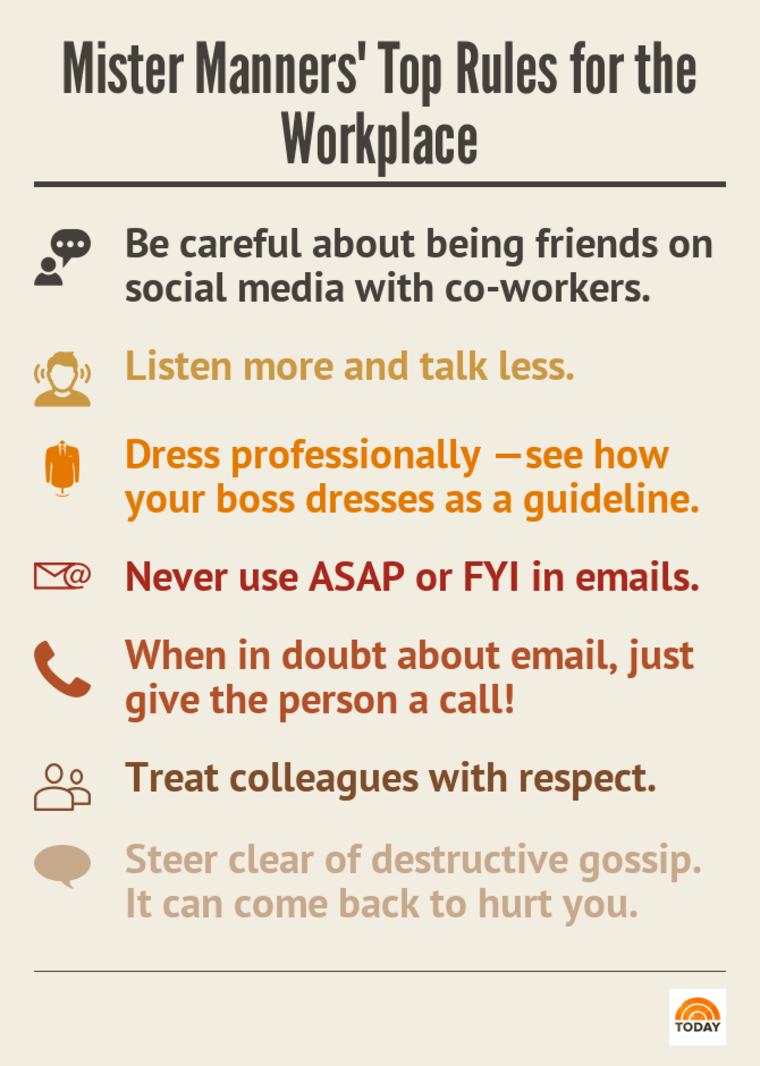Many of us spend almost as much time — if not more — at work as we do at home. And when you're working with the same people every day, conflicts are bound to come up, whether it's with that overbearing colleague, a backstabbing co-worker or the office gossip.
We spoke to Thomas Farley, aka Mister Manners, for his best advice on navigating trouble spots in the workplace as part of TODAY's "Manners on the Move" series.
Here are his top three tips:
1. Say "hello" and "goodbye" — every day.
Even if you haven’t had your first cup of coffee yet, there's no excuse for not greeting the people you see every morning, or forgetting to wish them a good night before you leave. It’s small touches like these that humanize the office. This is especially important considering many of us spend more waking hours with our colleagues than we do with our own friends and family.
2. Beware of email.
Consider face-to-face conversations or the phone whenever there is nuance involved, and if a conflict emerges over email, stop and speak with the individual in person.
Also watch out for the tone of your message. Many people write emails the way they write text messages, which can be misconstrued. Farley recommends sticking to a more formalized email for the first couple of correspondences with someone. Address the person by name, add a pleasantry — such as "Hope you had a good weekend!" — ask your question, and then end the email with a "thank you."
3. You can disagree without being disagreeable.
You may not always agree with what a colleague has to say, but at least give him or her the opportunity to share an idea or opinion. Try to avoid using words of resistance, including “but, except, unfortunately, however.” When people hear these words, they shut down and feel disregarded. Hearing people out empowers them and allows them to feel respected.
Following these guidelines will set you on the right track, but some situations require more delicate handling. Farley offered advice on dealing with these common workplace conflicts.
The Sandwich Thief
We've all seen those passive-aggressive notes in the workplace — maybe it's dirty dishes left in the pantry, an empty paper tray in the printer, or a sandwich thief on the loose.
If your lunch goes missing, there's a better way to address the situation — without sass.
First off, if you find that your disposable water bottle, Coke or smoothie has gone missing — someone may have honestly taken it by mistake. Make sure to label your lunch and drinks.
But if you know your lunch has been stolen, there are a couple of options you can explore. You can write a note and leave it in the kitchen — just make sure it isn't passive-aggressive. That won't help anyone. You can write a note with general lunchroom policies, such as: "Make sure the lunch you are taking is yours, and clean down surfaces after using them."
Another solution is to bring the issue up at your next staff meeting. You can start the conversation by asking, "What are some guidelines we can enforce in the kitchen?" By making the entire team a part of the conversation, you'll be able to establish expectations.
And, if none of the above works — put your lunch in a brown paper bag or lunchbox and keep it by your desk.
The Gossiping Co-worker
It's always hard to hear that a co-worker is talking badly about you behind your back.
Approach the person when he or she is alone. Farley suggests opening with: "There's something I need to discuss with you. Is there a time we can speak privately? It's of some importance."

When you sit down to talk, don't start a battle. Instead, say: "Some things have been getting back to me. I can imagine they aren't true, but perhaps there is some element that is true. Rather than stew about it, I wanted to come to you directly. I've been hearing you say (XYZ)."
If the gossip is related to a personal issue that you told the co-worker, explain that you told him or her in confidence. If the gossip is mean and untrue, approach the situation by saying, "Did I do something to upset you? If you have any issues with me I'd appreciate if you'd come to me first, in the future."
If the issue persists after your discussion, talk to your manager or someone from human resources.
The Meeting Hog
Have you been trying to get your two cents in during meetings, but find yourself getting talked over or cut off? Farley suggests having a conversation with the interrupter, and saying something like: "John, I admire the way you are able to share your thoughts in meetings so effectively. Do you have any tips? Could I count on you as my ally to step in if someone starts cutting me off during a meeting?"
This is an effective method because you are pointing out the behavior but not directing it at the offender.
RELATED:
How to be a great neighbor and help build your community in 3 simple steps
Airplane etiquette: How to handle seat kickers and other conflicts
Study says workplace stress is as bad as secondhand smoke: Tips on how to cope